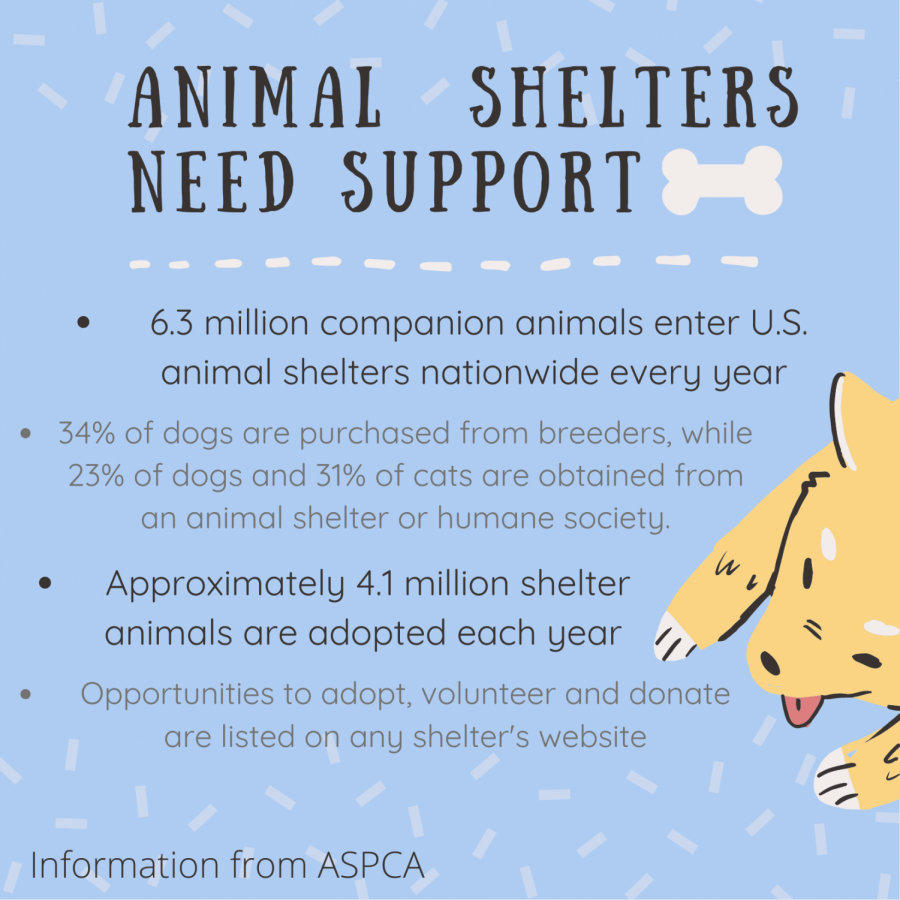Adopt, don’t shop
The importance of supporting animal shelters
Infographic by Brenna Batchelder
Information regarding shelters are found on their website. They offer animals for adoption and donation and volunteering resources.
November 4, 2021
When talking about animal cruelty, ads run by the American Society for the Prevention of Cruelty to Animals (ASPCA) pop up almost instantaneously in anybody’s mind. With their use of devastating images and sad music, this ad sticks in the minds of viewers. Through ads like these, the “adopt from shelters, don’t shop” mentality is spread. These ads do have their effectiveness but in the end, education about animal cruelty and where to adopt pets lies outside of the ads. With misinformation and the number of online pet shops increasing, the importance of sourcing pets through local shelters proves as crucial as ever.
The excitement of getting a new pet is overwhelming, but don’t let that anticipation blind unintentionally supporting cruelty. If dogs aren’t sourced through a reputable breeder or a shelter, your furry fido most likely comes from a puppy mill. These dog breeding facilities sell dogs online and even through pet stores. Though puppy mills are legal, the majority lack regulation. According to the National Humane Society, of an estimated amount of 10,0000 puppy mills in the United States, less than 3,000 are regulated by the U.S Department of Agriculture. The lack of regulated puppy mills leads to abuse and cruelty.
Unfortunately, these unregulated puppy mills run rampant in the midwest, especially in Nebraska and Iowa. Highlighting the hotspots for these facilities, the Humane Society inspects these facilities finding grueling conditions. Inspection results from a breeder in Fort Calhoun graphically described the scene as “ailed state inspection after an inspector found rodent and insect infestations; feces not cleaned for five to seven days; dogs were only given freshwater about twice a week.” After reviewing more of the results, the explicit descriptions of the conditions these animals were living in disgusted me.
Along with the abuse, unregulated puppy mills prove to even be detrimental to the environment. The Humane Society of the United States explains when this abuse leads to death due to neglect, the disposal of the carcasses violates environmental laws. A study the society completed showed that a dealer was disposing of 200 pounds of deceased dogs a month. The morbid number increases as bacteria from unclean feces and water, diseases, methane and ammonia spread in these facilities. Though these factors harm the dogs, it also has countless impacts on the native plant life and water supply.
With the prevalence of puppy mills in Nebraska and the midwest, paying close attention to the history of your pet is important. Though reputable breeders with a certification from the American Kennel Club are assured and regulated, the safest way to adopt a new furry friend is to go through a local shelter.
Aside from supporting a reliable shelter, the pet received will be getting another opportunity at a happy home, and another spot will be opening for another animal the second the papers are signed. These shelters are mostly run as non-profits and the funds they receive from adoption fees cover the majority of funding. Supporting these shelters, whether it be through adoption or donations, helps these non-profits save and take care of more animals, and it prevents overpopulation in these shelters.
The relationship between a pet and the shelter lasts longer than the alternative. These shelters typically assist new and long-time pet owners with resources regarding medical and care tips, and they provide an abundance of information owners might not be aware of. Even on the Nebraska Humane Society’s website, there is information regarding the vaccinations their pets receive, microchips, spaying/neutering all of their inhabitants receive. Meanwhile, the National Humane Education Society explains how puppy mills are not required to vaccinate their dogs.
Along with the lack of healthcare in puppy mills, the dogs who grow up in these conditions face behavioral issues. A survey done by the NAVC Small Animal Conference proved that dogs born in puppy mills display higher rates of fear, house-soiling and lower rates of trainability and energy. Shelters work with these traumatized animals and slowly socialize them to prevent these behavioral issues. From the second they are rescued, shelters socialize them and prepare for domestic life with their new owners. These valuable behavioral programs are even provided for pet owners through the shelter, regardless of the history of their dog.
Supporting shelters has countless benefits aside from just receiving a pet. The more we support these shelters instead of puppy mills will hopefully run these unregulated breeders out of business. Though there isn’t a clear solution to the issue of animal cruelty, educating new and old pet owners about the danger of puppy mills ensures that their time and money go towards brighter foundations. Omaha has multiple animal shelters that offer volunteer and donation opportunities that spread awareness about animal welfare. These organizations take steps to prevent abuse and support the families that do take in these animals.








fouundme • May 17, 2023 at 12:15 pm
Is an important message that advocates for adopting animals from shelters and rescue organizations rather than buying them from pet stores or breeders Adopt Don’t Shop for Pets. By embracing this philosophy, individuals can help save the lives of countless homeless animals and contribute to reducing pet overpopulation. Shelters are filled with loving and deserving pets of all kinds, ready to bring joy and companionship into your life. When you choose to adopt, you not only provide a loving home for a deserving animal but also support the invaluable work of animal rescue organizations. So, remember to “Adopt Don’t Shop for Pets” and make a difference in the lives of these wonderful creatures